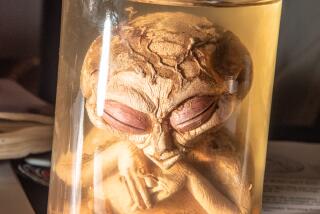A Little Fantasy Never Hurt
- Share via
It seemed like a promotional stunt for “The X-Files” movie: an international panel of respected scientists calling for “serious scientific study” of UFO-related phenomena. Recipients half-expected to find a “Just kidding!” buried in the 50-page report, issued Monday.
But the panel--composed of members from leading universities like Stanford, Princeton and Cornell--was cosmically serious, concluding that “it may be valuable to carefully evaluate UFO reports to extract information about unusual phenomena currently unknown to science.”
For example, the panel wants to know what happened in 1994 when an airplane crew and a military radar operator reported “a gigantic disk” more than 3,000 feet wide hovering over Paris. That doesn’t mean the panelists believe in flying saucers. But they’re rightly curious about what makes people think they are seeing something from outer space. In the past, close scrutiny has revealed that clouds, lightning, meteorites or weather balloons have led to most UFO reports; further scrutiny is likely to trace the real-world sources in most of the other cases.
Not that UFO theories will wither in the light of science, for the lure of the unknown seems eternal. Scientific debunking, in fact, has tended to inspire rather than suppress UFO theories--witness all the true-believer books, articles and movies that followed a science panel’s 1968 conclusion that no flying saucer had crashed near Roswell, N.M., in 1947. And even the best scientific studies are unlikely to dissuade us from the occasional belief that the colleague in the next chair is an extragalactic alien. Perhaps, as “The X-Files” creator Chris Carter puts it, science will never be able to explain all mysteries. Actually, that’s a relief.
More to Read
Sign up for Essential California
The most important California stories and recommendations in your inbox every morning.
You may occasionally receive promotional content from the Los Angeles Times.













